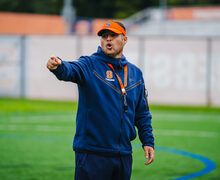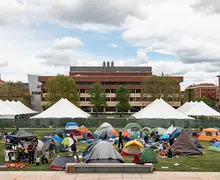Panelists question media’s war coverage
The American press has not been reporting the war on terror as well as it should be, said panelists at Tuesday night’s Society of Professional Journalists discussion about the media’s roles during conflict.
Steve Davis, a newspaper professor at the S.I. Newhouse School of Public Communications, where the forum was held, said he is concerned that the U.S. press has not been asking the government and military as much as it should.
‘Some questions have been asked, but many more aren’t being asked or answered. Maybe the press don’t have enough balls to ask more questions,’ he said.
Davis and the forum’s other panelists, David Bennett, a history professor at the Maxwell School of Citizenship and Public Affairs, and Newhouse broadcast journalism Professor Dow Smith, said the media have not been fulfilling their watchdog role because reporters have been too busy advocating for the United States.
‘They’ve been cheerleaders for the government,’ Bennett said. ‘Editors don’t want their reporters to be asking too much. They’re afraid the American public would be offended if the press questioned the government rather than cheered for them.’
Smith, who is also director of the Military Visual Journalism Program at Newhouse, said journalists are not reporting tough issues because they do not know what is happening in the war.
‘I don’t think our reporters have a clue,’ he said. ‘I don’t think we have any idea what’s going on.’
Reporters do not know what is happening because the military does not want them to, Bennett said.
“The military doesn’t want the press to know much about the war because it might have negative outcomes on public opinion on what’s being done,’ he said.
All three panelists agreed that much of the problem stems from the U.S. government’s censoring of this war more than others in U.S. history.
‘In other wars there was little to no censorship of reporter’s copy or film,’ Smith said. ‘They’d fly into the front lines with the military, but not today. There’s no way that’d be allowed.’
While some who attended the forum expressed concerns that asking the government for more detailed information about the war’s progress might impede the military effort, Smith disagreed.
‘It would be grossly irresponsible if any journalist reported on a mission before it happened, but that’s not what we’re talking about,’ he said. ‘It’s not wrong to ask questions about what’s going on and it won’t hurt anyone to get some real answers.’
Davis credited larger, national newspapers with continuing to question the government about the war. He said after a group of civilian Afghanis were killed when an American bomb hit the area where they were, some journalists began to investigate the military methods used in identifying targets and other similar stories.
‘Those were good questions and that’s what journalists need to do,’ he said.
Smith agreed.
‘That was good reporting,’ he said. ‘If this thing keeps going on and doesn’t make sense, hopefully the journalists will stop flag-waving and start asking questions.’
Published on February 26, 2002 at 12:00 pm




